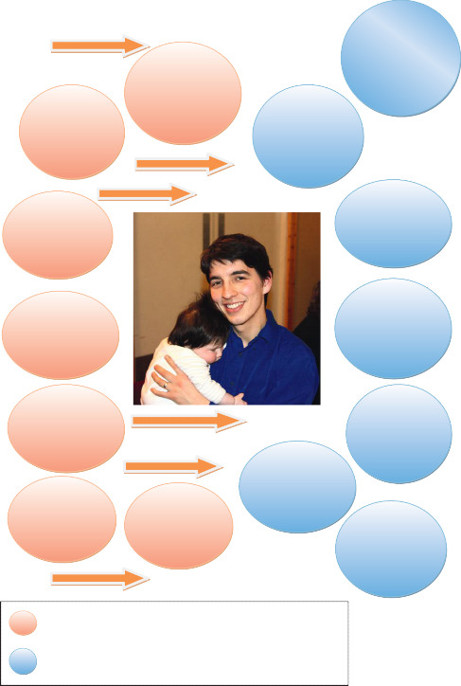Read Fundamentals of Midwifery: A Textbook for Students Online
Authors: Louise Lewis
Fundamentals of Midwifery: A Textbook for Students (77 page)

BOOK: Fundamentals of Midwifery: A Textbook for Students
12.55Mb size Format: txt, pdf, ePub
ads

Active fathering, particularly in the early years, has shown to have a positive impact on the child’s development (RCM 2011a). It has been identified that young fathers in particular are less likely to be involved in the care of their children (Fisher 2007) and some fathers experience their place in maternity care as being a ‘non-patient’ and a ‘non-visitor’ with the consequence of feeling excluded and fearful (Steen et al. 2012). A man’s own experience of being fathered can impact on how he develops relationships with his own children; society’s expectations of being a good dad can add to the challenges for fathers adapting to their new role (Raynor and England 2010). Fathers may worry about the financial implications that arrive with a new baby and how they will manage to provide. However, the demography of families have changed dramatically over the past 50 years and it is more common for mothers and fathers to both be working, and sharing earnings and caring responsibilities for the children (Fatherhood Institute Annual Report 2012–13). In the UK, fathers may be entitled to one or two weeks ordinary statutory paternity pay and up to 26 weeks paid additional paternity leave (but only if the mother returns to work); further details can be found online at GOV.UK. For those families requiring additional financial support, maternity care providers may need to signpost families to other appropriate agencies. Some Children’s Centres provide specialist sessions for fathers which allow them to share their experiences; details of these can be found within the local area of maternity service provision. Embedding father-inclusive practices and listening to fathers is a crucial part of the provision of postnatal care, promoting a smooth transition to parenthood. The RCM have published guidelines to help health professionals facilitate the involvement of fathers in maternity care (RCM 2011b). Figure 8.3 illustrates some of the positive and challenging elements of
fatherhood.
Safeguarding vulnerable adults and babies
Safeguarding means‘
protecting people’s health, wellbeing and human rights, enabling them to live
free from harm, abuse and neglect
’ (Care Quality Commission 2014). The groups identified as particularly requiring this protection are children, young people and vulnerable adults, but anyone can find themselves in circumstances in which they need safeguarding.
Midwives are seen as key workers in relation to safeguarding both adults and children (NMC 2009). Community midwives in particular, have the opportunity to meet with families and visit them in their homes, and therefore can assist in the prevention, identification, monitoring and reporting of concerns about the welfare of family members. Midwives are also important ele- ments of the safeguarding team as it is known that pregnancy and the postnatal period are times when abuse can start or become worse (NICE 2014). Midwives can assist in the support of families in order to facilitate an environment within the family which will reduce the risk of abuse of both children and adults. Focus should not just be on the woman and her baby, but also any other children or family members they meet. Health professionals need to be up to date and vigilant in identifying the signs of abuse and know the systems in place to report abuse (NICE 2014). This involves asking appropriate questions to all pregnant women about domestic abuse (Hardacre 2005), examining babies for signs of physical abuse (NICE 2009) and observing the interactions between women, partners and their babies (Williams et al. 2013). The recently
Positive emotions from the birth experience
Positive impact on child’s development and maternal well- being
Balancing anxieties of the journey to fatherhood with support for the woman

Maternity services “woman centred” leading to marginalisation and suppression of fathers needs

179
Healthy attachment and bond between father and baby
Sense of responsibility and achievement
Rite of passage Sign of maturity and manhood
Feelings of isolation due to the disembodied experience
Conflict of emotions and expectations between the mother and father
Financial anxieties and entitlement to paternity leave
Experience benefits of skin to skin contact
Virility
Effects of sleep deprivation on relationships
Society’s expectations on being a good father
Uncertainty of role
Relates to the positive feelings of fatherhood in the postnatal period
Relates to the challenges facing fathers in the postnatal period
Figure 8.3
The positive elements and challenges of fatherhood.
published NICE (2014) guidance on domestic violence and abuse makes specific recommenda- tions on these issues, stating that there needs to be ‘
the creation of an environment for disclosing domestic violence and abuse’ and that questions about this should be a ‘routine part of good clinical practice, even where there are no indicators
’ (NICE 2014, p. 11, p. 12).
This is an opportunity for interprofessional and interagency working; it is important to keep accurate and contemporaneous records and to communicate effectively with all those involved in the families care. Lack of communication and effective team working are key features in many serious case reviews, which examine the deaths of women and children (Saunders 2004).


180
Activity 8.3
Go to the NSPCC website and look at the serious care reviews listed below:
Oxfordshire, December 2013, Child Y. This demonstrates how poor communication can affect the protection of children and also identifies other lost opportunities to save the child.
York, October 2013, Baby A. Again poor communication between professionals was identified as an issue.
Coventry, September 2013, Daniel Pelka. The issues of culture, race, language and domestic abuse are relevant in this case. As well as the fact that the mother was manipulative and deceptive. What implications does this have for midwives?As part of midwifery education programmes, students attend specific sessions on safeguarding children and adults. These will continue throughout a midwive’s career.The Department of Education (2011a, p. 5) set out six principles of adult safeguarding which are:
empowerment
prevention
proportionality
protection
partnership
accountability.
These are further explained within the document focused on the role of healthcare profes- sionals (Department of Education 2011b). Readers are encouraged to access the document. An example of a relevant case is given on page 16; look at the case related to Susan, which will give some further insight as to how this system should work. Within the first principle of empower- ment is embedded the ideal that a person has the capacity to give or refuse consent unless proven otherwise. This is related to the Mental Capacity Act 2005; all student midwives and midwives should be fully aware of the implications of this Act.

Activity 8.4
The five key principles of the Mental Capacity Act 2005 are outlined and explained on the NMC website. [Available online] http://www.nmc-uk.org/Nurses-and-midwives/Regulation-in-practic
e/ Regulation-in-Practice-Topics/consent/
Go to the site and read these principles; think about their implications for midwifery practice.
Where to get help
There are identified workers within all Trusts and working environments who play a key role in
the safeguarding of children and adults. They can be contacted to ask for advice and to seek support when there are concerns. Supervisors of Midwives can assist in this process and student midwives and midwives should use the supervisory framework in order to safeguard those in their care (see Chapter 1: ‘To be a midwife’, where supervision of midwives is discussed in greater depth). Student midwives should also seek advice from their mentors.

BOOK: Fundamentals of Midwifery: A Textbook for Students
12.55Mb size Format: txt, pdf, ePub
ads
Other books
Branded by a Warrior by Andrea Thorne
Spirits (Spirits Series Book 1) by Destiny Patterson
A Vile Justice by Lauren Haney
Bang!: A History of Britain in the 1980s by Graham Stewart
High Stakes Seduction - Book 2 by LeCoeur, Ami
Badwater by Clinton McKinzie
Once Upon a Power Play by Jennifer Bonds
Never Run From Love (Kellington Book Four) by Driscoll, Maureen
Liars, Inc. by Paula Stokes
Death and Deceit by Carol Marlene Smith
